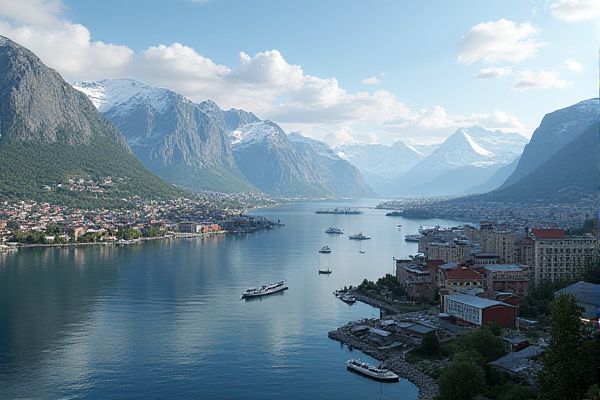
Utilities setup and providers in Norway: Electricity providers: Agva, Fortum, Hafslund Strom. Deregulated energy market. Water supply: Public utility companies. Heating: District heating or individual systems. Broadband: Telenor, Get, NextGenTel. Mobile networks: Telia, Telenor, Ice.net. TV services: Canal Digital, RiksTV. Waste management: Kommunal (municipal) services. Internet speed: High-speed fiber available. Utility bills: Autogiro direct debit preferred.
Electricity providers: Agva, Fortum, Hafslund Strøm.
Agva Kraft is a prominent electricity provider in Norway, specializing in the residential and SMB markets, known for its efficient conversion engine and competitive pricing. Fortum, the largest electricity retail business in the Nordics, serves over 2 million customers in Norway, offering electricity and related digital services. Meanwhile, Hafslund Strom, acquired from Fortum, continues to manage electricity distribution in the Ostfold area.
Deregulated energy market.
In Norway, the energy market was deregulated with the Energy Act of 1991, creating a market-based system with open competition in electricity production and sale. This deregulation led to the separation of production, distribution, and transmission, with Statnett managing the national transmission grid and the Norwegian Water and Power Authority (NVE) regulating the sector to ensure non-discriminatory access and fair pricing. For more detailed insight into these changes, visit the Energy Market Deregulation PDF.
Water supply: Public utility companies.
In Norway, the water supply is primarily managed by public utilities, with Norwegian Water (Norsk Vann) representing the water industry, including approximately 319 municipalities and 98% of the population. This organization ensures a reliable 24/7 water supply and wastewater services through municipal-owned companies and affiliated members.
Heating: District heating or individual systems.
In Norway, District Heating is a prominent method, particularly in larger buildings and urban areas. A significant portion of this heating comes from waste incineration and bioenergy, which collectively constitute major sources, accounting for about 45% and an increasing share of production, respectively. Alongside district heating, individual heating systems like electric heating and heat pumps are also commonplace. Heat pumps are especially popular in households, with over one million units installed. For more detailed insights into this sustainable energy method, you can explore the Norwegian Energy Supply website.
Broadband: Telenor, Get, NextGenTel.
Telenor, Get, and NextGenTel are prominent broadband providers in Norway. Telenor is one of the largest providers, offering reliable internet and a wide selection of TV channels, especially catering to both urban and rural areas. Get is known for its customizable packages, allowing users to choose their internet speed and TV channels. NextGenTel, acquired by Kistefos in 2019, provides broadband, TV, and telephony services through various technologies including fiber and fixed wireless access, serving around 60,000 customers.
Mobile networks: Telia, Telenor, Ice.net.
In Norway, the main mobile network providers are Telenor, Telia, and Ice. Telenor and Telia offer the widest 4G coverage, with Telenor serving over 3 million customers and Telia providing nationwide 5G coverage. Ice, a budget-friendly option, operates on Telenor's infrastructure but has slightly limited coverage outside major cities. Telia is also the first to achieve nationwide 5G coverage, enhancing speeds and connectivity across the country.
TV services: Canal Digital, RiksTV.
RiksTV is Norway's sole distributor of digital TV and HDTV via both antenna and internet, covering 98% of households and 90% of holiday homes, and offers services on Smart TVs and through its OTT service Strim. Canal Digital, on the other hand, is a commercial TV operator mentioned in the context of industry disputes and conferences, but it does not have the same terrestrial network monopoly as RiksTV.
Waste management: Kommunal (municipal) services.
In Norway, municipal waste management is primarily handled by companies like BIR AS, which is owned by several municipalities and is responsible for waste collection, recycling, and treatment for numerous residents across multiple municipalities, focusing on sustainable and statutory waste management tasks. Other notable municipal waste management companies include Renovasjonen i Bergen, AVINET, Norsk Gjenvinning, and Ragn-Sells, which also emphasize efficient and environmentally friendly waste management solutions. For more detailed information about their operations, you can visit the BIR AS website.
Internet speed: High-speed fiber available.
In Norway, IN, high-speed fiber internet is available, with LightStream offering 1000 Mbps speeds and covering 97.14% of the area, making it one of the most reliable and fastest internet options. For more detailed information and insights about internet providers in the region, you can refer to Reviews.org, which provides comprehensive data and comparisons for residents seeking efficient connectivity solutions.
Utility bills: Autogiro direct debit preferred.
In Norway, utility bills can be managed through the AvtaleGiro direct debit system, which is similar to Autogiro in Sweden. This system allows for automatic payment collection from the customer's bank account, facilitated by banks like Nordea, and is commonly used for both consumer and corporate markets.
